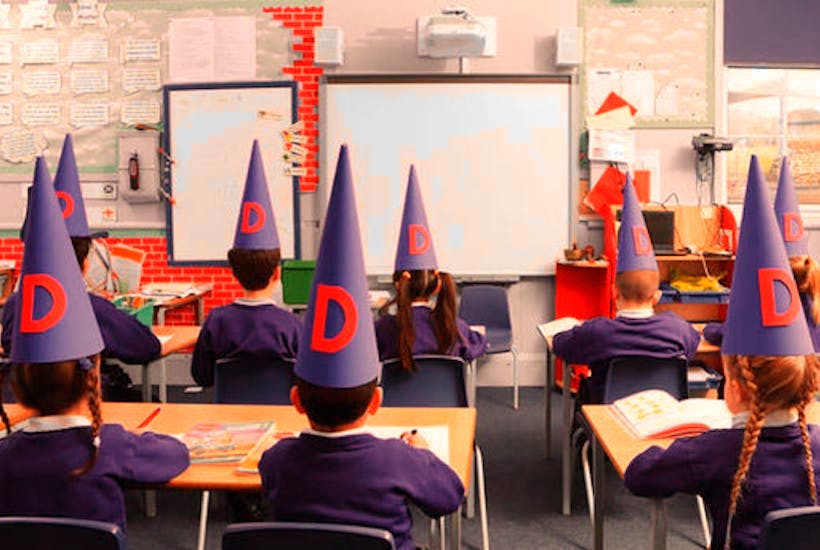If ever the public needs additional evidence as to why Australia’s education system is either flatlining or going backwards based on international literacy, numeracy and science tests despite the billions invested, look no further than the February edition of the Australian Council for Educational Research Discovery newsletter.
The ACER, led by Geoff Masters, presents itself as one of Australia’s premier educational organisations at the cutting edge of research related to school education including how best to monitor and improve standards and what constitutes the most effective classroom practice. Under the heading ‘School education, 21st-century skills, School improvement’ the first item details five webinars addressing ‘the big five challenges facing Australian education’. According to Masters, students are now facing a world ‘that demands discerning engagement with sophisticated information about complex societal and environmental challenges’. Central to the webinars is a progressive, new-age approach to the curriculum involving ‘more active and dynamic teaching and learning paradigms’ based on 21st-century skills that are ‘complex, multi-dimensional, cross-disciplinary and non-routine’. Ignored is the research undertaken by academics at the American National Association of Sciences that demonstrates skills are domain specific instead of rising in a cross-disciplinary fashion.
The academics conclude the ability ‘to think (about) and solve problems depends strongly on a rich body of knowledge about subject matter’. Contrary to focusing on so-called generic, cross-curricula skills the American academics argue in-depth understanding ‘requires a detailed and organised understanding of important facts within a specific domain’.
The second item included in the newsletter is titled ‘Debunking the equity myth in education’. In it Masters argues a curriculum and assessment regime based on year levels is inequitable and unjust because some students do better than others. Instead of a meritocratic system, Masters proposes replacing year level standards with individualised progression points mapped against a so-called developmental continuum. Instead of judging how well a student has performed by ranking her or him against a year level standard or against other students in the class as measured by an A to E grading or numerically, Masters favours formative assessment. There are no winners or losers as each student is measured against his or her own progress over time.
Masters argues the existing form of summative assessment is inequitable as all students are ‘judged against the same finish line; the year-level curriculum expectations’. Obviously, Masters has never taught in a school as if adopted his preferred form of assessment would overwhelm teachers with an unmanageable workload and deny students and their parents a realistic and credible form of assessment. Masters is also responsible for the third article, one closely aligned with the second and titled ‘Why the curriculum should be based on students’ readiness, not their age’. While schools are generally organised and managed on the basis students are grouped in terms of year levels based on age, Masters argues in favour of ‘untimed syllabuses’.
When justifying this radical change Masters writes, ‘The 21st century requires a more flexible and personalised approach. Learners of the future will learn anywhere at any time, progressing at their own rates, often with the support of technology. In this world, there will be no place for determining what individuals are ready to learn from their age’.
Once again, such a proposal where teachers are expected to individually monitor, evaluate and set work for every student they teach on a daily and weekly basis represents a herculean task guaranteed to overwhelm and exhaust teachers.
Masters argues the reason Australian students underperform in international mathematics, science and literacy tests is because schools are organised according to years levels where students are grouped and assessed according to their age. The assumption is to abolish year levels, remove summative assessment and allow each student to progress at their own rate and test results will improve.
Demonstrated by the 2014 review of the national curriculum I co-chaired, plus a number of international benchmarking projects carried out over the last 20 years, state and territory curricula are overloaded, superficial and steeped in political correctness and new age ideology. Instead of mastering essential content students are fed a steady diet of generic competencies like being creative and working in teams plus cross curricula priorities involving indigenous, Asian and environmental perspectives.
In addition to the formal curriculum, schools are forced to teach everything from stranger danger, wellness, resilience, healthy eating, cyberbullying to road safety and radical gender and sexuality programs like the neo-Marxist inspired Safe Schools. The approach to teaching and learning prevalent in teacher training institutions has also led to declining standards and ineffective pedagogy.
Instead of explicit teaching where teachers are figures of authority and in control the prevailing orthodoxy is one where teachers are facilitators and guides by the side. Students are central and lauded as knowledge navigators and digital natives where the emphasis is on student engagement and student agency.
Such is the lack of teacher authority and the prevalence of fads like open classrooms and non-structured, inquiry-based learning that Australian students are among the most disruptive and ill-disciplined among the OECD countries.
Another reason why standards continue to either flatline or deteriorate further is because academics responsible for teacher training and professional bodies like the Australian Association for the Teaching of English, for many years, have rejected memorisation and rote learning.
Such approaches are derided as ‘drill and kill’ and ‘parroting information’. Ignored is the cognitive research proving the importance of memorising material until it can be recalled automatically. Especially in the early years and when students are encountering new content and skills, in order to develop what is termed ‘automaticity’, repetition and repeated practice are essential.
One of the most depressing aspects of the sad and inevitable decline in standards is that those bodies and organisations responsible, such as the ACER, tout themselves as educational experts at the leading edge of educational innovation and change. Ignored is the evidence including their past history proving the opposite is the case.
Dr Kevin Donnelly has just released Cancel Culture and the Left’s Long March (available at kevindonnelly.com.au).
Got something to add? Join the discussion and comment below.
Get 10 issues for just $10
Subscribe to The Spectator Australia today for the next 10 magazine issues, plus full online access, for just $10.


























Comments
Don't miss out
Join the conversation with other Spectator Australia readers. Subscribe to leave a comment.
SUBSCRIBEAlready a subscriber? Log in